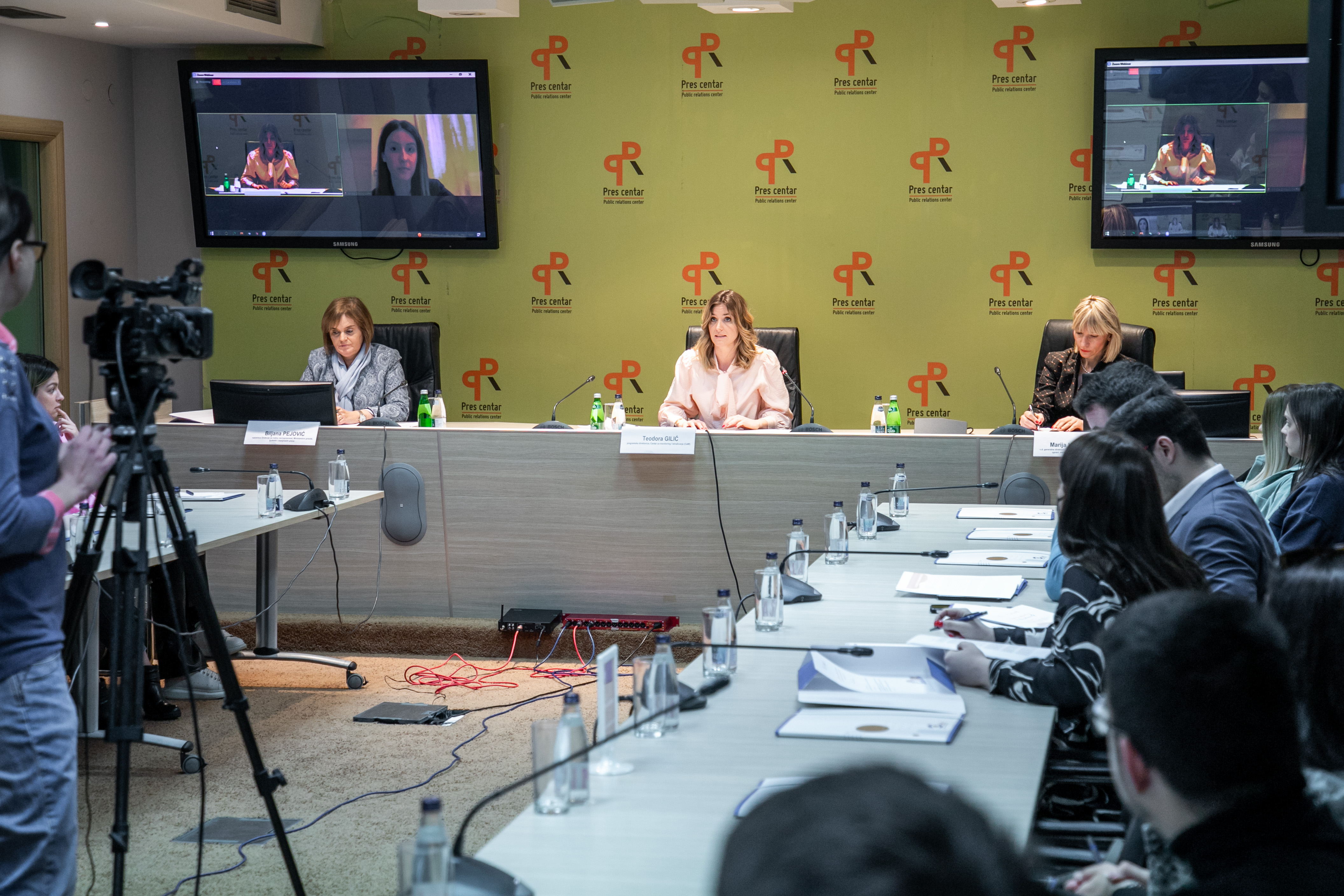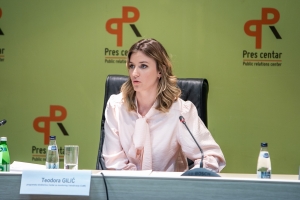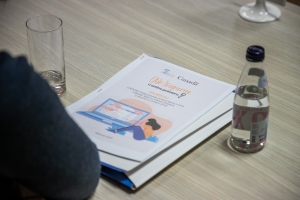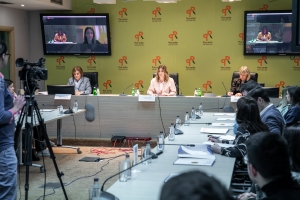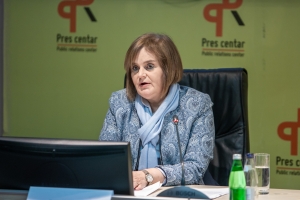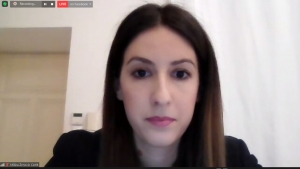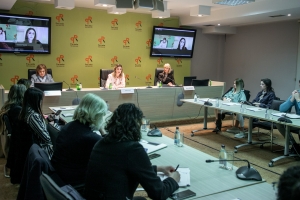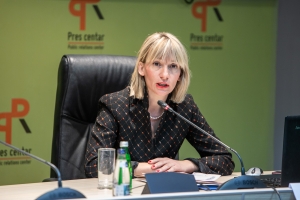Podgorica, PR press service - Users of social networks in Montenegro most often use unfounded moral discreditation based on physical characteristics or disrespect for stereotypical roles of women in society, and attacks are most often manifested against women who hold high-ranking positions.
This was announced at the panel discussion "The impact of gender-based disinformation and online violence against women in politics on the process of democratization and EU integration in Montenegro", organized by the Centre for Monitoring and Research (CeMI).
The program director of CeMI, Teodora Gilić, said that we are witnessing more frequent occurrences of systemic internet violence against dissidents in Montenegro, which is coordinated by various political centers, including political parties.
"Some political parties, which are financed almost exclusively by citizens' money from the budget, pay for campaigns to discredit prominent individuals on social networks. Prominent individuals in society, creators of public opinion, NGO leaders are becoming the target of brutal campaigns of misstatement and insults. The goal is to intimidate those who are the target, but also to threaten everyone else who expresses their own opinion ", stated Gilić.
She pointed out that women in politics are one of the most exposed groups to this type of violence, stating that society does not have an appropriate response to combating this problem.
"In this project, CeMI analyzed the emergence of misogyny, the spread of gender-based disinformation and online attacks on women whose jobs are public, referring to those involved in politics, activism, journalists, etc. It is noticeable that hate speech is always spread towards those women who express their views on certain political issues and events in public, "said Gilić.
These women, as she added, are exposed to sexist and misogynistic comments on social networks, photos of their bodies are used to make inappropriate caricatures and ”all with the aim of discrediting them and in some way "punishing" them for engaging in politics as “men's business”.
"At CeMI, we believe that this problem should be given more attention in society and that we need a systematic response. We need the cooperation of the state, media, social networks, regulatory bodies, and non-governmental organizations so that we can stop the growing internet violence against like-minded people," said Gilić.
She assessed that it is important to work on educating women about their digital rights, teaching them to recognize online violence and informing them about the protection mechanisms available to them.
"Therefore, we strongly advocate strengthening institutional protection, so that women feel safer in the online space, and are empowered to react if they become victims of online violence," said Gilić.
Project coordinator in Centre for Monitoring and Research, Milica Zrnović said, presenting the "Report on Gender-Based Disinformation and Online Violence against Women in Politics in Montenegro", that they conducted monitoring in that organization that focused on monitoring content, reactions and comments on Facebook via the CrowdTangle platform from September 2021 to February 2022.
"During the monitoring period, the activity of 79 pages was observed: 25 activities of the media, 17 political parties, five politicians, 11 state bodies, 21 meme pages. The sample included a total of 115,532 published contents ", stated Zrnović.
She explained that only 995 (one percent) of the sampled content concerned or reported on misogyny, sexism in public discourse, hate speech in general, but also condemnations of the same directed at women in political and public life in Montenegro.
“The monitoring showed that unfounded moral discreditation based on physical characteristics or disrespect for stereotypical roles of women in society is most often used on social networks, and the like, which results in frequent intimidation and threats to women in politics, both anonymous and in person and direct ", said Zrnović.
She pointed out that the research showed that attacks are most often manifested against women who hold high-ranking positions, i.e., who have a role in the decision-making process and management of published content, "said Zrnović.
"Regularly, women MPs, ministers, election list holders, and others are target of the media and comments. The focus of the content was women present in political and public life, namely: MP Draginja Vuksanović Stanković 29%, MP Božena Jelušić 11%, Minister Vesna Bratić 8%, MP Aleksandra Vuković 5%, Minister Tamara Srzentić 4%”, said Zrnovic.
She pointed out that in the observed period, there were a total of 86,684 user interactions on the sampled contents related to gender-based violence against women in politics, stating that the most common reaction was “like” 55% and “laugh” 23%.
"When we talk about the comments, of which there were 14,261 during the monitoring period, the main characteristic is the frequent appearance of vulgar words that are present in the sampled content on Facebook. Hate speech was recognized in 212 comments on the contents of mime pages on Facebook (5.6 %), and in 140 comments on the contents of the media (1.3 percent)," said Zrnović.
She explained that, when it comes to mime pages, the monitoring showed that as many as 63 % of the sampled mime posts contained elements of mocking women in politics through graphic and video modifications and the use of technology.
"When it comes to media reporting, more than half of the media headlines were informative, but there are also those who add a sensationalist tone. Sampled media content shared on Facebook with topics of violence against women in politics are most common in the form of news and announcements, i.e., reactions, while rare, almost no articles that provide deeper insight into sensitive topics, such as interviews with people whose rights are endangered or in which violence against women in politics is approached analytically, interpretatively and with arguments, with the presentation of qualified interpretations," said Zrnović.
Speaking about the public reaction to cases of gender-based disinformation and online violence against women, Zrnović said that it was noted that in Montenegro, public condemnation, which is not present in all cases, is the only reaction and sanction.
"When it comes to the reports received by CeMI, they referred to inappropriate comments directed at members of the Parliament of Montenegro, and more than half of the reports concerned comments that were published on the official Facebook page of a political party," said Zrnović.
The Chief of the Directorate for Gender Equality, in the Ministry of Justice, Human and Minority Rights, Biljana Pejović, said that hate speech is present on social networks where the media do not pay enough attention to its censorship or do not have enough capacity to regulate it.
"The mass media is of great importance for policies for the implementation of gender equality, as well as for achieving the goals of gender equality. We have adopted several documents which call on the creators of media policies to take responsibility for the success of the implementation of gender equality policy, as well as the state to contribute to the improvement of media policies," said Pejović.
She reminded that national laws also oblige the mass media to avoid gender stereotypes, gender discrimination, as well as to actively contribute to the policy of gender equality.
"The strategy of gender equality was adopted last year for the period 2021-2025. where it is stated that the media should take care not to reflect gender stereotypes and to regularly take acction through their editorial policy to combat the use of sexist hate speech, " added Pejović.
Marija Hajduković, the General Director of the Directorate for Strategic Planning in Public Administration, International Cooperation, and IPA Projects, said that women in office and in public life could influence change, create a society of equal opportunities, and create opportunities for some new girls who, perhaps, did not have equal opportunities.
"Through the key document in the field of public administration Public Administration Reform Strategy for the period 2022-2026, we have paid a lot of attention and recognized gender equality. The significant progress has been made, and recognized activities permeate all strategic activities which contribute to the application and promotion of this standards", stated Hajduković.
According to her, through the Agenda related to further digitalization of Montenegro, it is important to promote and launch initiatives that will affirm women in public administration, ICT sector, platforms for girls who encode, and use the moment so that the digitalization of all processes equally would be the result of the work of both women and men.
Hajduković reminded that according to current Law on media hate speech is the subject of urgent court proceedings, but only at the request of the competent prosecutor, stating that this is considered as a shortcoming of the act, because in practice the mechanism is poorly or not used at all.
"Also, hate speech is not represented in the Criminal Code as a separate criminal offense. So far, Montenegro has not dealt with hate speech and disinformation in any strategic document. The lack of cooperation and communication among the Montenegrin media, which have been preventing the establishment of effective self-regulation for many years, adversely affects the fight against misinformation and hate speech, "said Hajduković.
She pointed out that the best European practice shows that it is not only possible to fight this problem with repression or regulation, but, as she said, a minimum of consensus in the journalistic community is necessary to give a credible answer to this challenging social phenomenon.
"These and other important issues related to disinformation, the role and importance of the media were also addressed in the first Media Strategy of Montenegro, which is currently the subject of public debate," added Hajduković.
The event was held as a part of the project called "Fight against gender-based disinformation and online violence against women in politics in Montenegro by educating women and advocating campaign", which was financially supported by the Canadian Embassy in Belgrade through the Canadian Fund for Local Initiatives.
